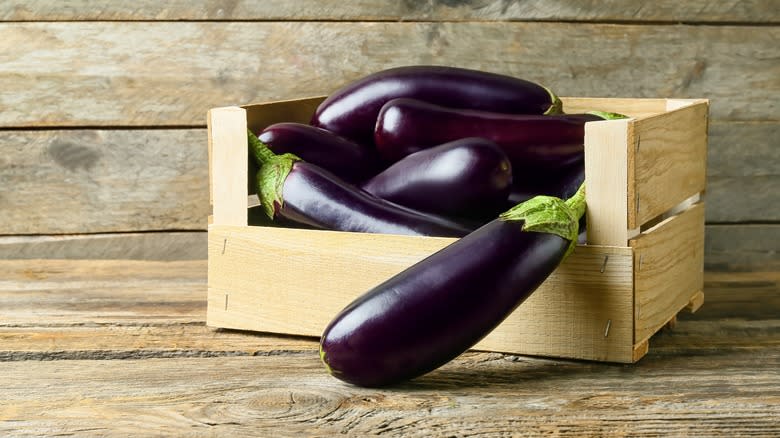The Surefire Way To Freeze Eggplants For Later Use

If you've found yourself with a bounty of eggplants and no immediate plans to use them, freezing them is the way to go. However, that doesn't mean just tossing these purple veggies into the freezer. The surefire way is to cook them in the oven first. Eggplants contain a lot of water, and when frozen raw, this water forms ice crystals that can damage the cell structure of the vegetable — leading to a mushy, unappetizing texture upon thawing. Cooking before freezing mitigates this issue by partially dehydrating the eggplants.
The process begins with deciding how you'll use the eggplants in the future. This determines how you'll prepare them before cooking. If you plan to make dishes like eggplant parmesan or stir-fries, slicing the eggplants is the way to go. On the other hand, if you envision dips or spreads, like baba ganoush, cooking the eggplants whole and then puréeing is your best bet.
For the sliced version, begin by cutting the veggies into slices of about one-inch thickness. Lay them on a lined baking sheet, ensuring they don't overlap. Roast in a preheated oven at 350 F until tender for about 15 to 20 minutes, depending on the thickness of the slices. For whole eggplants, first, pierce them with a fork. Place them on a baking sheet and roast at 400 F until they're completely soft and their skin begins to wrinkle — about 30 to 45 minutes. Once they're cool enough to handle, scoop the flesh out.
Read more: 13 Simple Tricks To Pick The Best Fresh Fruit Every Time
Freezing And Thawing Cooked Eggplant

After cooking, let the eggplants cool completely. If you've sliced them, lay the slices flat on a baking sheet and flash freeze until solid. This prevents them from sticking together. For puréed eggplant, portion it into freezer-safe containers or ice cube trays for smaller servings. Once frozen, transfer the slices or purée into freezer bags or containers. Label them with the date to keep track of how long they've been in the freezer.
Frozen cooked eggplant can last in the freezer for eight to 12 months. However, for the best quality, try to use it within a few months. The longer it's stored, the more its texture and flavor can degrade. When it's time to use your frozen eggplant, thawing is a straightforward process. For most dishes, you can add the frozen veggie directly into the cooking process. However, if you want to eat it as is, simply leave it in the refrigerator overnight to thaw, then reheat it the next day and eat. In essence, freezing cooked eggplant not only preserves it for future use, but also ensures that you have a ready-to-use ingredient that adds flavor and depth to your eggplant recipes.
Read the original article on Tasting Table.


